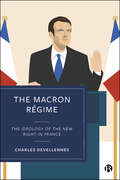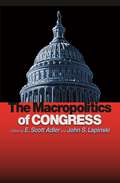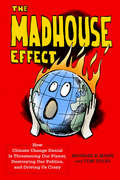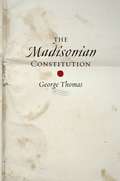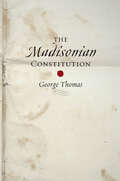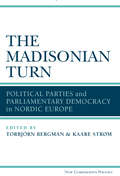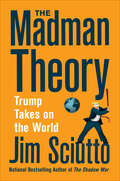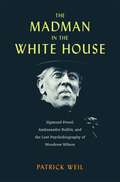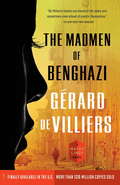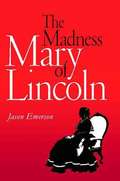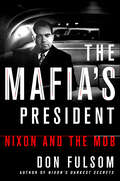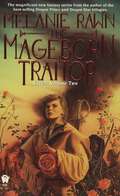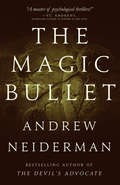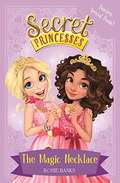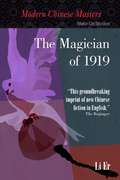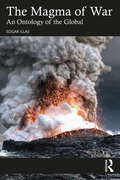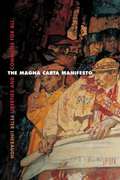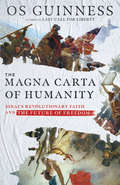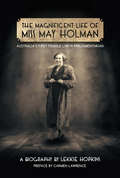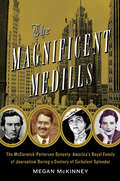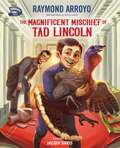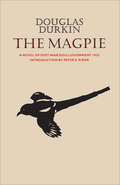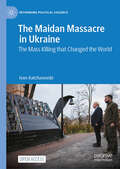- Table View
- List View
The Macron Régime: The Ideology of the New Right in France
by Charles DevellennesWhen Emmanuel Macron was elected President of the French Republic, it ended the long-standing political alternation between the mainstream right- and left-wing parties. This book examines Macron’s political career from his rise as a public figure to his time as a president. The book explores Macron’s political ideology and examines the enactment of the key notions of security, merit and hope during his time in office. By offering a close study of his actions and ideological commitment, this book argues that, despite claims of being ideologically neutral, Macron actually represents a new form of right-wing politics in France.
The Macropolitics of Congress
by E. Scott Adler and John S. LapinskiHow do public laws, treaties, Senate confirmations, and other legislative achievements help us to gain insight into how our governmental system performs? This well-argued book edited by Scott Adler and John Lapinski is the first to assess our political institutions by looking at what the authors refer to as legislative accomplishment. The book moves beyond current research on Congress that focuses primarily on rules, internal structure, and the microbehavior of individual lawmakers, to look at the mechanisms that govern how policy is enacted and implemented in the United States. It includes essays on topics ranging from those dealing with the microfoundations of congressional output, to large N empirical analyses that assess current theories of lawmaking, to policy-centered case studies. All of the chapters take a Congress-centered perspective on macropolicy while still appreciating the importance of other branches of government in explaining policy accomplishment. The Macropolitics of Congress shines light on promising pathways for the exploration of such key issues as the nature of political representation. It will make a significant contribution to the study of Congress and, more generally, to our understanding of American politics. Contributors include E. Scott Adler, David Brady, Charles M. Cameron, Brandice Canes-Wrone, Robert S. Erikson, Grace R. Freedman, Valerie Heitshusen, John D. Huber, Ira Katznelson, Keith Krehbiel, John S. Lapinski, David Leblang, Michael B. MacKuen, David R. Mayhew, Nolan McCarty, Charles R. Shipan, James A. Stimson, and Garry Young.
The Madhouse Effect: How Climate Change Denial Is Threatening Our Planet, Destroying Our Politics, and Driving Us Crazy
by Michael Mann Tom TolesThe award-winning climate scientist Michael E. Mann and the Pulitzer Prize–winning political cartoonist Tom Toles have been on the front lines of the fight against climate denialism for most of their careers. They have witnessed the manipulation of the media by business and political interests and the unconscionable play to partisanship on issues that affect the well-being of billions. The lessons they have learned have been invaluable, inspiring this brilliant, colorful escape hatch from the madhouse of the climate wars. The Madhouse Effect portrays the intellectual pretzels into which denialists must twist logic to explain away the clear evidence that human activity has changed Earth's climate. Toles's cartoons collapse counter-scientific strategies into their biased components, helping readers see how to best strike at these fallacies. Mann's expert skills at science communication aim to restore sanity to a debate that continues to rage against widely acknowledged scientific consensus. The synergy of these two climate science crusaders enlivens the gloom and doom of so many climate-themed books—and may even convert die-hard doubters to the side of sound science.
The Madisonian Constitution
by George ThomasThis volume examines four crucial moments in the United States' political history--the Civil War and Reconstruction, the Progressive Era, Franklin Delano Roosevelt's presidency and the New Deal, and the Reagan revolution--to illustrate the Madisonian view that the present rise of judicial supremacy actually runs counter to the Constitution as established at the nation's founding.
The Madisonian Constitution (The Johns Hopkins Series in Constitutional Thought)
by George ThomasToday, we think of constitutional questions as being settled by the Supreme Court.But that is not always the case, nor is it what the framers intended in constructing the three-branch federal government. This volume examines four crucial moments in the United States' political history—the Civil War and Reconstruction, the Progressive Era, Franklin Delano Roosevelt's presidency and the New Deal, and the Reagan revolution—to illustrate the Madisonian view that the present rise of judicial supremacy actually runs counter to the Constitution as established at the nation’s founding.George Thomas opens by discussing how the Constitution encourages an antagonistic approach to settling disputes, thereby preserving itself as the nation's fundamental law rather then ceding that role to the president, Congress, or Supreme Court. In considering the four historical case studies, he focuses on judicial interpretations and the political branches' responses to them to demonstrate that competing conceptions of constitutional authority and meaning, as well as intergovernmental disputes themselves—rather than any specific outcome—strengthen the nature of the nation's founding document as a political instrument.Engagingly written and soundly argued, this study clarifies and highlights the political origins of the nation's foundational document and argues that American constitutionalism is primarily about countervailing power not legal limits enforced by courts.
The Madisonian Turn: Political Parties and Parliamentary Democracy in Nordic Europe
by Kaare Strom Torbjorn BergmanParliamentary democracy is the most common regime type in the contemporary political world, but the quality of governance depends on effective parliamentary oversight and strong political parties. Denmark, Finland, Iceland, Norway, and Sweden have traditionally been strongholds of parliamentary democracy. In recent years, however, critics have suggested that new challenges such as weakened popular attachment, the advent of cartel parties, the judicialization of politics, and European integration have threatened the institutions of parliamentary democracy in the Nordic region. This volume examines these claims and their implications. The authors find that the Nordic states have moved away from their previous resemblance to a Westminster model toward a form of parliamentary democracy with more separation-of-powers features---a Madisonian model. These features are evident both in vertical power relations (e.g., relations with the European Union) and horizontal ones (e.g., increasingly independent courts and central banks). Yet these developments are far from uniform and demonstrate that there may be different responses to the political challenges faced by contemporary Western democracies.
The Madman Theory: Trump Takes on the World
by Jim SciuttoNew York Times–bestselling author of The Return of Great Powers: A“compelling” study of the damage done to US national security by Donald Trump (Michael Isikoff, New York Times–bestselling author of Find Me the Votes).From praising dictators to alienating allies, Trump made chaos his calling card. Was it a strategy, like Richard Nixon’s attempt to destabilize communist bloc countries by appearing just crazy enough to nuke them—the “madman theory”? Trump praised Kim Jong-un and their “love notes,” admired and flattered Vladimir Putin, and gave a green light to Recep Tayyip Erdogan to invade Syria, while attacking US institutions and officials, ignoring the best information and intelligence available to him, and turning his back on allies from Canada and Mexico to NATO to Ukraine to the Kurds at war with ISIS. He continually caught the world off guard, but did it serve a purpose?Jim Sciutto, a George Polk and Edward R. Murrow Award winner, shows how Trump’s supporters assumed he had a strategy—that he somehow played three-dimensional chess. Four years later, it was clear his unpredictable focus on short-term headlines did in fact lead to predictably mediocre results in both the short and long run. His foreign policy undermined American national security interests while leaving longtime allies isolated and vulnerable—and comforting and emboldening our enemies. The White House’s revolving door of staff demonstrated that Trump had no real plan; all serious policymakers—and those who would be a check on his most destructive impulses—were exiled or jumped ship.Sciutto interviewed a wide swath of then-current and former administration officials to assemble the first comprehensive portrait of the impact of Trump’s erratic foreign policy. The Madman Theory is the definitive take on Trump’s calamitous legacy around the globe, showing how his proclivity for chaos created a world more unstable, violent, and impoverished than it had been before.“An ominous warning.” —Kirkus Reviews“Combines fine reporting with intelligent analysis in a way that is unusual and enlightening—and entertaining.” —William Kristol
The Madman in the White House: Sigmund Freud, Ambassador Bullitt, and the Lost Psychobiography of Woodrow Wilson
by Patrick Weil“A rich study of the role of personal psychology in the shaping of the new global order after World War I. So long as so much political power is concentrated in one human mind, we are all at the mercy of the next madman in the White House.”—Gary J. Bass, author of The Blood TelegramThe notorious psychobiography of Woodrow Wilson, rediscovered nearly a century after it was written by Sigmund Freud and US diplomat William C. Bullitt, sheds new light on how the mental health of a controversial American president shaped world events.When the fate of millions rests on the decisions of a mentally compromised leader, what can one person do? Disillusioned by President Woodrow Wilson’s destructive and irrational handling of the 1919 Treaty of Versailles, a US diplomat named William C. Bullitt asked this very question. With the help of his friend Sigmund Freud, Bullitt set out to write a psychological analysis of the president. He gathered material from personal archives and interviewed members of Wilson’s inner circle. In The Madman in the White House, Patrick Weil resurrects this forgotten portrait of a troubled president.After two years of collaboration, Bullitt and Freud signed off on a manuscript in April 1932. But the book was not published until 1966, nearly thirty years after Freud’s death and only months before Bullitt’s. The published edition was heavily redacted, and by the time it was released, the mystique of psychoanalysis had waned in popular culture and Wilson’s legacy was unassailable. The psychological study was panned by critics, and Freud’s descendants denied his involvement in the project.For nearly a century, the mysterious, original Bullitt and Freud manuscript remained hidden from the public. Then in 2014, while browsing the archives of Yale University, Weil happened upon the text. Based on his reading of the 1932 manuscript, Weil examines the significance of Bullitt and Freud’s findings and offers a major reassessment of the notorious psychobiography. The result is a powerful warning about the influence a single unbalanced personality can have on the course of history.
The Madmen of Benghazi
by Gérard De VilliersTHE MADMEN OF BENGHAZI, available for the first time in the U.S., is a gripping, racy, ripped-from-the-headlines espionage thriller set in volatile post-Qaddafi Libya. Gérard de Villiers (1918-2013) spent his five-decade career cultivating connections in the world of international intelligence, which allowed him to anticipate geopolitical events before they occurred--and to masterfully blend fiction with an insider's knowledge of international affairs. Published from 1964 until his death in 2013, his bestselling SAS series of 200 spy novels, starring Malko Linge, was long considered France's answer to Ian Fleming, with Malko as his James Bond.Its hero, Malko Linge, an Austrian aristocrat, spends his time freelancing for the CIA in order to maintain his ancestral home and support his playboy lifestyle.When terrorists try to shoot down a plane carrying Libyan prince Ibrahim al-Senussi, it is clear that someone wants him dead. But the CIA has its own plot for the prince: Now that Qaddafi has been overthrown, al-Senussi is their best bet to set up a constitutional monarchy and stem the Islamist tide in Libya. The CIA, which needs Malko as much as he needs them, sends the Austrian aristocrat to Cairo to learn more about al-Senussi's plans by seducing his companion, a ravishing British model. This mission is enormously appealing, but also proves enormously dangerous, as the same madman of God who is trying to kill al-Senussi also takes aim at Malko.From the Trade Paperback edition.
The Madness of Mary Lincoln
by Jason EmersonIn 2005, historian Jason Emerson discovered a steamer trunk formerly owned by Robert Todd Lincoln's lawyer and stowed in an attic for forty years. The trunk contained a rare find: twenty- five letters pertaining to Mary Todd Lincoln's life and insanity case, letters assumed long destroyed by the Lincoln family. Mary wrote twenty of the letters herself, more than half from the insane asylum to which her son Robert had her committed, and many in the months and years after. The Madness of Mary Lincoln is the first examination of Mary Lincoln's mental illness based on the lost letters, and the first new interpretation of the insanity case in twenty years. This compelling story of the purported insanity of one of America's most tragic first ladies provides new and previously unpublished materials, including the psychiatric diagnosis of Mary's mental illness and her lost will. Emerson charts Mary Lincoln's mental illness throughout her life and describes how a predisposition to psychiatric illness and a life of mental and emotional trauma led to her commitment to the asylum. The first to state unequivocally that Mary Lincoln suffered from bipolar disorder, Emerson offers a psychiatric perspective on the insanity case based on consultations with psychiatrist experts. This book reveals Abraham Lincoln's understanding of his wife's mental illness and the degree to which he helped keep her stable. It also traces Mary's life after her husband's assassination, including her severe depression and physical ailments, the harsh public criticism she endured, the Old Clothes Scandal, and the death of her son Tad. The Madness of Mary Lincoln is the story not only of Mary, but also of Robert. It details how he dealt with his mother's increasing irrationality and why it embarrassed his Victorian sensibilities; it explains the reasons he had his mother committed, his response to her suicide attempt, and her plot to murder him. It also shows why and how he ultimately agreed to her release from the asylum eight months early, and what their relationship was like until Mary's death. This historical page-turner provides readers for the first time with the lost letters that historians had been in search of for eighty years.
The Mafia's President: Nixon and the Mob
by Don FulsomThe first-ever full account of Nixon's extensive ties to the American Mafia, from a veteran White House reporter.Unbeknownst to most people even now, the election of 1968 placed the patron saint of the Mafia in the White House. In other words, Richard Nixon would go on to not only lead a criminal presidency; he would be totally indebted to our nation’s top mobsters.By 1969, thanks in large part to his long-time campaign manager and political advisor Murray Chotiner, a lawyer who specialized in representing mobsters, Nixon had participated in secret criminal dealings for more than 20 years with sketchy figures such as Mickey Cohen, Mob financial guru Meyer Lansky, Teamsters union chief Jimmy Hoffa, and New Orleans Mafia boss Carlos Marcello. And with Chotiner as one of his key behind-the-scenes advisors in the White House, Nixon's ties to the Mafia didn't end there. The Mafia’s President reveals a mind-blowing litany of favors Nixon exchanged with these sinister characters over decades, ranging from springing Jimmy Hoffa from prison to banning the federal government from using the terms “Mafia” and “La Cosa Nostra.”Drawing on newly released government tapes, documents, and other fresh information, The Mafia’s President by Don Fulsom offers a carefully reported, deeply researched account of Richard Nixon’s secret connections to America’s top crime lords.
The Mageborn Traitor: Exiles, Volume 2 (Exiles #2)
by Melanie RawnThe Mage Guardians have survived the war?barely. Now Mage Captal Cailet and her sister Sarra are struggling to rebuild their society?politically, economically, and magically. Yet though defeated, their ancient enemies, the Malerissi, have not been destroyed, and under the leadership of Cailet?s and Sarra?s sister Glenin, these masters of a darker magic are once again weaving a web with which to entangle the entire world. And even as Cailet?s dreams of a restored Mage Hall become a reality, Glenin prepares to strike at the veryheart of both her sisters? power...? The second novel in the Exiles trilogy!? 1.8 million copies of Melanie Rawn?s DAW books in print!? All of Melanie Rawn?s books have been national bestsellers? Stunning cover art by Michael Whelan
The Magic Bullet
by Andrew NeidermanFrom the “expert weaver of suspense” and author of The Devil’s Advocate comes this “riveting tale about the medical ‘what if’ of a cure for cancer” (Fresh Fiction). Dr. Allan Parker may have found the magic bullet the world has been waiting for all these years—the cure for cancer in the blood of fifteen-year-old Taylor Petersen. But there’s only so much blood in Taylor’s body, and so many desperate people. One of the most desperate is Frankie Vico, a mobster who faces the death sentence of inoperable, terminal cancer for which there is no reprieve. And with time running out, he’s learned of one last hope. Now he’ll stop at nothing, including kidnapping and murder, to get his hands on Taylor’s precious blood. Caught in a deadly chase with only Dr. Parker to help him, Taylor will have to fight to save his own life . . . and millions of others. “An exhilarating thriller that grips the audience with the concept of the magic bullet elixir . . . Terrific.” —The Mystery Gazette “Populated by realistic characters and propelled by a fresh and exciting plot . . . A very good, very tight thriller.” —Booklist
The Magic Necklace – Bumper Special Book!: Book 1 (Secret Princesses #1001)
by Rosie BanksA gorgeous new series about magical princesses and best friends. Book one is a special long adventure for even more magical fun! Best friends Charlotte and Mia can't bear it when Charlotte's family moves far away. But when they're given magic necklaces, they begin an amazing adventure together - and they can see each other whenever they like! When their magic necklaces whisk them to Wishing Star Palace, Charlotte and Mia meet the Secret Princesses, magical princesses who make wishes come true for girls just like them. Best of all, Charlotte and Mia have what it takes to become Secret Princesses themselves! But when the girls go to grant their first wish they're in for a nasty surprise - horrid Princess Poison is determined to stop the wish from coming true... Can Charlotte and Mia grant Olivia's wish and save Wishing Star Palace? Plus...* Special campaign with Monsoon Children's - win the same princess outfits as Charlotte and Mia for you and your best friend!* Collect the tokens for a exclusive Best Friends necklace designed by Monsoon!
The Magic Rings: The Magic Rings (The Rescue Princesses #6)
by Paula HarrisonThese are no ordinary princesses--they're Rescue Princesses!Princess Emily's sister, Lottie, is the newest member of the Rescue Princesses. She's very excited to have animal adventures of her very own.When a foal disappears from the palace stables, Lottie is eager to prove she has what it takes to be a true Rescue Princess.
The Magician of 1919: Christmas Eve
by Li Er'The Magician of 1919' is an exciting introduction to the writing of acclaimed avant-garde Chinese author Li Er . In 1919, the year of the May 4th movement in China, magician Bigshot Cowrie arrives in Peking. He has with him a budgerigar, which is a language genius, a hat with a magical long queue and some pigeons. During his time in Peking, he encounters various figures, fictional and historical, and becomes involved in important events in modern Chinese history.
The Magma of War: An Ontology of the Global
by Edgar IllasWar, from the conflicts in the Middle East and Russia/Ukraine to Mexican narco-violence, from neocolonial land grabs in the Global South to racial, border, health, and climate crises all over the planet, defines the most extreme and contradictory expression of the global world. In this fascinating exploration on the history of the thinking of conflict, Edgar Illas departs from military and sociological analyses to propose a theoretical exploration of war as the ontological force that produces political orders.Magma is used as a geological metaphor to theorize the mixtures of politics and war that organize, and disorganize, global society. Divided into two parts, Illas’ study begins by surveying some of the most important thinkers of war, moving from classical antiquity to the twentieth century. Each thinker provides a different inflection in the historical evolution of the being of war. The second part turns to a theorization of the twenty-first century to claim that conflictive relations between capital, state power, political movements, and social life in globalization culminate and at the same time reiterate the paradoxes of war as an ontological event.The Magma of War is an energizing contribution to the task of rethinking politics in relation to war and an invaluable resource to all those conscious of the unstable forms of contemporary social and political life.
The Magna Carta Manifesto: Liberties and Commons for All
by Peter LinebaughThis book shines a fierce light on the current state of liberty and shows how longstanding restraints against tyranny--and the rights of habeas corpus, trial by jury, and due process of law, and the prohibition of torture--are being abridged and demonstrates how these ancient rights are repeatedly laid aside when the greed of privatization, the lust for power, and the ambition of empire seize a state.
The Magna Carta of Humanity: Sinai's Revolutionary Faith and the Future of Freedom
by Os GuinnessIn these stormy times, loud voices from all fronts call for revolution and change. But what kind of revolution brings true freedom to both society and the human soul? Cultural observer Os Guinness explores the nature of revolutionary faith, contrasting between secular revolutions such as the French Revolution and the faith-led revolution of ancient Israel. He argues that the story of Exodus is the highest, richest, and deepest vision for freedom in human history. It serves as the master story of human freedom and provides the greatest sustained critique of the abuse of power. His contrast between "Paris" and "Sinai" offers a framework for discerning between two kinds of revolution and their different views of human nature, equality, and liberty. Drawing on the Hebrew and Christian Scriptures, Guinness develops Exodus as the Magna Carta of humanity, with a constructive vision of a morally responsible society of independent free people who are covenanted to each other and to justice, peace, stability, and the common good of the community. This is the model from the past that charts our path to the future. "There are two revolutionary faiths bidding to take the world forward," Guinness writes. "There is no choice facing America and the West that is more urgent and consequential than the choice between Sinai and Paris. Will the coming generation return to faith in God and to humility, or continue to trust in the all sufficiency of Enlightenment reason, punditry, and technocracy? Will its politics be led by principles or by power?" While Guinness cannot predict our ultimate fate, he warns that we must recognize the crisis of our time and debate the issues openly. As individuals and as a people, we must choose between the revolutions, between faith in God and faith in Reason alone, between freedom and despotism, and between life and death.
The Magnificent Life of Miss May Holman Australia's First Female Labor Parliamentarian
by Lekkie HopkinsThroughout the 1930s May Holman was a household name and aninspiration to the women of her generation. She made history in 1925when, at age thirty-one, she became Australia’s first female Laborparliamentarian, holding the seat of Forrest until her untimely death onthe eve of the 1939 elections.A woman who fought tirelessly for the rights of those in her electorate, heraccidental death received national coverage with thousands of WesternAustralian mourners lining the streets to pay tribute.May Holman charted new territory for women, but the barriers sheencountered and her methods of overcoming them still resonate today.
The Magnificent Medills: The McCormick-Patterson Dynasty: America's Royal Family of Journalism During a Century of Turbulent Splendor
by Megan McKinneyThe riveting story of the country’s first media dynasty, the Medills of Chicago, whose power and influence shaped the story of America and American journalism for four generations When thirty-two-year-old former lawyer Joseph Medill bought a controlling stake in the bankrupt Chicago Daily Tribune in 1855, he had no way of foreseeing the unparalleled influence he and his progeny would have on the world of journalism and on American society at large.Medill personally influenced the political tide that transformed America during the midnineteenth century by fostering the Republican Party, engineering the election of Abraham Lincoln and serving as a catalyst for the outbreak of the Civil War. The dynasty he established, filled with colorful characters, went on to take American journalism by storm. His grandson, Colonel Robert R. McCormick, personified Chicago, as well as its great newspaper, the Chicago Tribune, throughout much of the twentieth century. Robert’s cousin, Joseph Medill Patterson, started the New York Daily News, and Joe’s sister, Cissy Patterson, was the innovative editor of the Washington Times-Herald. In the fourth generation, Alicia Patterson founded Long Island’s Newsday, the most stunning journalistic accomplishment of post–World War II America. Printer’s ink raged in the veins of the Medills, the McCormicks and the Pattersons throughout a century, and their legacy prevailed for another five decades—always in the forefront of events, shaping the intellectual and social pulse of America. At the same time, the dark side of the intellectual stardom driving the dynasty was a destructive compulsion that left clan members crippled by their personal demons of chronic depression, alcoholism, drug abuse and even madness and suicide.Rife with authentic conversations and riveting quotes, The Magnificent Medills is the premiere cultural history of America’s first media empire. This dynamic family and their brilliance, eccentricities and ultimate self-destruction are explored in a sweeping narrative that interweaves the family’s personal activities and public achievements against a larger historical background. Authoritative, compelling and thoroughly engaging, The Magnificent Medills brings the pages of history that the Medills wrote vividly to life.
The Magnificent Mischief of Tad Lincoln (Turnabout Tales)
by Raymond ArroyoFrom New York Times bestselling author and news anchor Raymond Arroyo comes a fun picture book biography of Tad Lincoln, his relationship with his father President Abraham Lincoln, and a story about a parent&’s love for his son and the wisdom of a child. Full of humor, this romp through history will teach children about the power of curiosity, imagination, friendship, empathy, determination…and even a little mischief!Tad Lincoln was forever getting into trouble. He bounced around the White House making mischief and annoying almost everyone but the president. Yet Tad was his father&’s joy and comfort amidst a brutal war, a family tragedy, and the toll of holding the nation&’s highest office. When Tad befriends a turkey meant to be holiday dinner, his plea for the pet to be spared teaches Abe a lesson about mercy. It also starts the tradition of the presidential turkey pardon, a tradition that presidents carry on to this day.In The Magnificent Mischief of Tad Lincoln readers 4-8 will:learn about the larger-than-life personality of Tad Lincoln and his father President Abe Lincoln, highlighting the importance of familysee the impact of empathy and understanding towards othersbe inspired by Tad&’s resilience and determination, as he overcomes challenges learning to read and dealing with a speech impedimentenjoy Tad&’s mischievous and adventurous spirit, encouraging children to embrace their curiosity, explore new ideas, and make a difference in the lives of others by being themselves The Magnificent Mischief of Tad Lincoln includes:an annotated list of resourcesa fun history lesson about a favorite holiday traditionvibrant illustrations by artist Jacqui Davisan author&’s note by Raymond Arroyo, New York Times bestselling author of The Spider Who Saved Christmas Check out Raymond Arroyo&’s book The Unexpected Light of Thomas Alva Edison, also part of the Turnabout Tales series, which explores the hidden, pivotal moments that define some of history&’s greatest men and women.
The Magnitude and Sources of Disagreement Among Gun Policy Experts, Second Edition
by Andrew R. Morral Terry L. Schell Rosanna SmartThis report describes combined results from two fieldings of a survey of gun policy experts. In particular, respondents estimated the likely effects of 19 gun policies on ten outcomes, such as firearm homicides and the right to bear arms. Researchers use the results to identify where experts agree and disagree the most and whether disagreements stem from assumptions about the effects of gun policies or from differences in policy objectives.
The Magpie: A Novel of Post-War Disillusionment 1923
by Douglas Durkin Peter RiderOne of the most complex experiences for Canadians was World War 1 and its attendant social upheavals. Because of the lack of a clear description of the emotional forces of the period, historians have tended to concentrate on the political manifestations of agrarian and working class unrest. There are no well-known sources for social commentary, a lack that makes this novel important as an historical document. Originally published in 1923, The Magpie is an articulate and perceptive work which provides an accurate description of the disillusionment that developed after the war when it became apparent that many of the government's promises of social reform were not going to be fulfilled. Craig Forrester – nicknamed 'The Magpie' because of his terseness in conducting business on the Winnipeg Grain Exchange – is appalled by the greed, hypocrisy, and intolerance of the 'decent' classes and opts for persona morality and social justice. Rejecting urban life, he returns to the farm of his childhood, symbol of the traditional values of honesty and simplicity. By having his hero make this choice, Durkin adopts one of the greatest themes of Canadian literature and intellectual thought – the agrarian myth. A secondary theme, of particular interest today, is the role of women in post-war society and the evolution of moral codes. The three women in 'The Magpie's' life achieve surprising degrees of personal autonomy.
The Maidan Massacre in Ukraine: The Mass Killing that Changed the World (Rethinking Political Violence)
by Ivan KatchanovskiThis open access book provides a comprehensive analysis of the Maidan massacre in Ukraine. It uses a theoretical framework of rational choice, moral hazard, state- repression backfire, and Weberian ideas about rational action to explore the massacre. The book draws on publicly available videos, photos and audio recordings of the massacre in English, Ukrainian, Russian, Polish and other languages, along with several hundred individual testimonies and revelations from the Ukrainian investigation and a trial and its verdict. By examining which parties were responsible for the massacre, the book analyses its implications for not only Russia’s war on Ukraine but also political developments across the globe.
